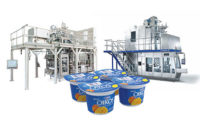Machinery Technology: Filling & Closing
The big boom: Filling and closing equipment has come a long way
With revolutionary integrations, filling and closing equipment has come a long way.






Filling and closing has become more flexible, more compact and somewhat confusing. Should you buy the hype? The machinery has two jobs: Filling a pouch, bottle, carton, vial or the like and then closing it – by sealing, capping or otherwise. Don’t go for the bells and whistles if you’re not going to use the bells and whistles. The newest innovations mentioned here have some new features and still stick to what they do best: fill and seal.
For the popular pouch, a new system called the OptiPouch fills and closes up to 600 pouches per minute. The rotary machine from Optima (optima-packaging.com) also displays maximum flexibility in the process. It covers a format area of 50ml to 1,500ml without format parts. The format change takes place “on the fly.”
Pouch designs can be customized in many different ways, whether stand-up pouches or side-gusseted bags with centered or corner spouts. Various closure types such as “no spill,” “anti-choke” or dosing dispensers can be integrated. There are also various laminated film structures to choose from. All bags are prefabricated and checked individually for tight sealing before delivery.
The compact footprint stands at approximately 47 m² (just over 500 square feet). The hygienic design of the OptiPouch system has many features, including moisture protection in accordance with IP67/NEMA 4X.
OptiPouch was created in cooperation with Fuji Seal (fujiseal.com/en). Fuji Seal developed a special compact delivery system for the supply of pre-made spouted pouches and also an automatic feeding system to the filler.
Can filling just got easier with the compact filler for craft brewers. The KHS Group (khs.com) just launched the Innofill CAN Compact, a small yet mighty machine designed for outputs of 10,000-48,000 cans per hours. This filler and seamer combo is shipped to the customer as a complete machine in a single container, and commissioned on site on a plug-and-produce basis. The Innofill CAN Compact has a CO2 purging system that enables low oxygen pickup, which allows it to consume about 30% less carbon dioxide than conventional systems.
The hygienic design includes a gapless bell guide with PTFE expansion joints (Teflon) and bells that are lifted and positioned fully electropneumatically to seal the cans. KHS also uses PTFE materials in the filling valve, for example to seal the filling valve piston and in the gas membranes. Flavor carryover when changing the product to be filled is as good as eliminated. And for volume capability, the new central product tank, installed at the top of the filler carousel, has a working volume of 50 to 200 liters.
Zalkin (zalkin.fr/en/menu-presentation), powered by Pro Mach, introduced the TM300 FILLCAPP, a single-head stand-alone capper with integrated filler, at Interpack this year. A single-station machine can automatically fill and cap up to 30 containers per minute (CPM) and up to 60 CPM for two-station models. This cost-effective machine features quick changeover, fast clean-in-place and superior fill accuracy for brands and co-packers in the food, beverage, spirits, personal care, home care and chemical industries.
Applications include small-volume containers ranging from energy drinks to mini bottles of distilled spirits to travel-sized personal care products to extracts, condiments, oils and more.
The TM300 FILLCAPP delivers precision filling – rated between +/- 0.25 to 0.5% of volume for a wide range of product viscosities. A variety of filling measuring devices are available, including volumetric pump, Coriolis mass flow meter, magnetic flow meter, net weight scale, overflow nozzle and piston. There is a zero-drip vacuum collection system and inclined top deck with gutters and drain.
Whether it’s pouches, bottles, cartons, syringes or vials, there is a solution – many, really. When searching for a filler & closer, make sure that the equipment does what you need it to do with any add-ons you will need now and possibly in the future. Performance, footprint, cost and flexibility should be considerations.
|
When tradition meets the future In this case study, the South African drink Mageu receives a boost to safety, shelf life and appeal through a packaging upgrade. On every kitchen table in The Republic of South Africa, you can find one similarity. Mageu, Maxau, maHewu, amaRhewu or amaHewu – there are many names of the traditional non-alcoholic, non-dairy drink made from fermented mealie pap (maize meal). RCL Foods, a leading food producer in the region, is the manufacturer of Number One brand Mageu, available in a convenient cardboard carton since 1969. 
Believing strongly in the corporate tagline “More food to more people, more often,” RCL Foods operates across Africa delivering, among others, the Mageu drink. Keeping in mind the hot climate, severe transportation conditions and the short life span of this product, RCL Foods was looking for a packaging solution that would extend the shelf life of the drink, safeguard the product’s quality and provide it with a new, refreshed look. Food safety comes firstThe company’s attention turned to Ampack 
The Ampack filling machine was designed according to the latest hygiene guidelines, ease of use and productivity in mind. Throughout the filling process, the packaging material is thoroughly decontaminated and the product is kept in sterile conditions to avoid any loss in quality. The solution is capable of handling three different bottle sizes (250ml, 500ml and 1L), with format changes taking less than 20 minutes and total speeds of up to 14,000 bottles per hour, depending on packaging format. The new machine was installed in the current production facility in Pretoria, South Africa, with the primary aim to fill Mageu drink, but it can handle various products with different levels of viscosity. Think locally, support globallyAmpack designed and assembled the machine in just 10 months. In order to speed up the acceptance phase at the customer´s site, Ampack performed an additional aseptic test directly in Königsbrunn, Germany, facility. This way Ampack specialists were sure the machine could be commissioned quickly and would run smoothly for the customer’s full satisfaction. Moreover, during the installation time, RCL Foods operating staff went through extensive training in all areas of machine operation and maintenance. The customer can also rely on the local support of Bosch experts based in Johannesburg, who are available to assist the client if need be. In the end, RCL Foods received what it was promised – a ground-breaking solution which significantly improves food safety, consumer and retailer experience, as well as its own production site. Moreover, the African market gained a long-awaited alternative for packing its traditional drink in a more hygienic and secure way to meet the future demands of its customers. |
Looking for a reprint of this article?
From high-res PDFs to custom plaques, order your copy today!










